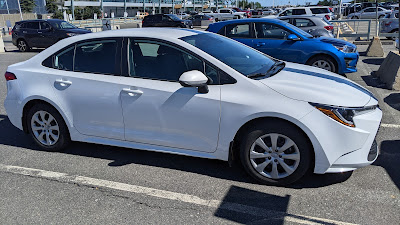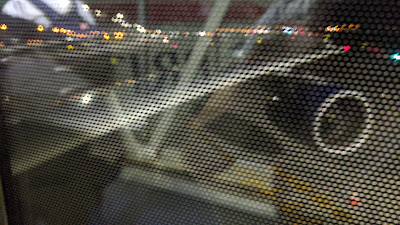 |
| Google Gemini CC0 |
The national story is the suspension of Jimmy Kimmel from his late-night talk show on the ABC television network.
Where Kimmel apparently crossed a red line with ABC parent Disney was his equation of the accused assassin of Charlie Kirk with the America-first MAGA movement. The comment stoked right-wing ire, and Kimmel was accused of inciting or supporting political violence—an inferential leap he did not make. In the light of day, I find Kimmel's comment in poor taste. But he did not advocate for political violence.
I support the prerogative of Disney, as a private creative company—subject to procedurally proper and viewpoint-immaterial business regulation, such as antitrust law, which has been under-enforced in the administrations of both parties—to make decisions about what content it wishes to broadcast. But as in the case of cancelled late-night host Stephen Colbert, the decision here is not about reasoned disagreement, rather is about capitulation to government threats to use state power unlawfully and unconstitutionally.
Circumstances strongly suggested that Colbert's Late Show was canceled because of government threats to use the Federal Communications Commission (FCC) broadcast licensing authority to block the merger of CBS parent Paramount with media company Skydance. But it was difficult to find direct rather than circumstantial evidence of the connection between the government and Paramount.
No longer. FCC Chairman Brendan Carr plainly threatened to use FCC power to attack Nexstar, the company that owns a great many ABC affiliates that carry Disney content. Nexstar and Disney are said to be courting, and Nexstar has a history of dissatisfaction with FCC regulation that would stymie the growth of its media empire. So the FCC threat to Nexstar was taken to heart in the boardroom, The Wall Street Journal reported, and became a threat to business partner Disney, in turn.
Curious how the anti-regulatory right is suddenly interested in a strong administrative state.
The problem here is that censorship of political content, that is, political viewpoint discrimination, is not a legitimate basis for the FCC, nor most any governmental authority, to flex its muscle in interference with the private market. The closest Carr came to a legitimate rationale for FCC retaliation was the assertion that programming such as Kimmel's perpetuates false information.
Yet even if that were a proper basis for government intervention—arguable, depending on the nature of the information alleged false—there is no evidence that false assertions of fact by Kimmel or anyone else motivated Carr's threat. Whatever one thinks of Kimmel's appraisal of the Kirk murder, or of MAGA, he uttered only opinion.
Incidentally, President Trump's lawsuit against The New York Times Co. this week evidences the same disregard for the difference between fact and opinion. The voluminous complaint is rife with allegations that establish a difference of opinion, but precious few claims of false assertions of fact. So over the top is the complaint that it evidences the abject failure of the legal profession to regulate itself as a profession. (UPDATE, Sept. 19: Did I underestimate the profession? See Trump v. N.Y. Times Co. (M.D. Fla. Sept. 19, 2025). HT @ Dan Greenberg.)
To be clear, if Disney wants to suspend Kimmel because executives don't like his politics, fine. I might worry about whether antitrust law is enforced with sufficient vigor, or simply whether our media infrastructure is sufficiently healthy, that Americans have access to a wide range of viewpoints through audiovisual media. But my worries would not warrant interference with a business owner's political prerogative.
My objection here is to the threatened abuse of power by the FCC. A broadcast regulatory authority picking who may and who may not have access to media channels based on the broadcaster's support for the ruling regime is naked and shameful authoritarianism.
And then there is the local.
In my community of Barrington, Rhode Island, a teacher, Benjamin Fillo, has been suspended from Barrington Public Schools for his TikTok comments about Charlie Kirk.
Once again, I find the speaker's comments in poor taste. According to The New York Post and to WLNE—an ABC affiliate which, incidentally, recently became the second local news broadcaster under the control of the right-wing-disinformation-associated Sinclair group, somehow without provoking FCC regulatory objection—Fillo called Kirk a "piece of garbage" and accused him of hatred for the LGBTQ community and hostility to women's rights and democracy.
Like Kimmel, Fillo did not advocate for political violence. I would like him to have condemned it. But that preference is mine.
Also, as a parent in this community, I am sympathetic to parents' concerns that the public school be a place of neither ideological indoctrination nor ideological marginalization.
What worries me here is that Fillo's speech occurred on TikTok, outside the school, outside his capacity as a teacher, at least insofar as has been reported. His video seems to have effected no "material and substantial disruption" of the schoolhouse, to use the probably applicable constitutional language, other than disruption by people who self-servingly would claim disruption.
The school district has hired an independent investigator. Sounds a bit Orwellian, but better than a summary firing. What's concerning is that, again, as far as I have seen reported, the investigation is based only on extramural speech, and worse, Fillo was placed on administrative leave for his extramural speech. So already he's been singled out and penalized upon no apparent evidence that he poses any threat to students.
When my daughter was a minor in Barrington schools, she had teachers with whom I disagreed, and with whom she disagreed, politically, and who had different religious beliefs from mine, and from hers, just like I have law students who have different opinions and beliefs from mine. The appropriate pedagogy, which my daughter's teachers employed, and which I endeavor to employ, albeit in the different context of graduate school, is to equip students to disagree. It's not an easy line to draw, but that's the job of a teacher.
What does not work, what I would not want from my child's teachers, and what I try not to do in the classroom, is to pretend to be some kind of politically neutered Ken doll incapable of forming a personal viewpoint. That's what no teacher should model for students. Yet that seems to be what Barrington schools, and too many parents, want to see.
That Fillo has opinions outside the school, whether or not I agree with them, whether or not students and parents agree with them, suggests to me only that he is a good teacher, because he is a whole and thinking human being. If he had no discernible political views, I would wonder whether he were competent to teach social studies.
The takeaway from both these matters seems to be that our society is suffering a worrisome intolerance for disagreement.
It's becoming cool and normal for government to use its power to enforce group-think—a place I thought the right promised to move us away from. And it's becoming cool and normal for employers, even public employers, to capitulate to demands that group-think be enforced, or at least that dissent be suppressed.
The marketplace of ideas is a flawed metaphor. But it's not all wrong. What I know for sure is that ours should not be a country in which the marketplace of ideas sells only one kind of bread, and everyone must get in line for it.















